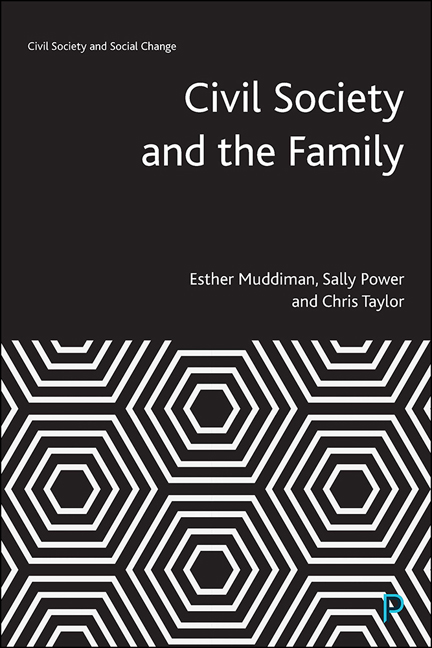Book contents
- Frontmatter
- Contents
- Tables
- Figures
- Notes on the Authors
- Acknowledgements
- 1 Starting Points
- 2 The Paradoxical Positioning of the Family and Civil Society
- 3 The Challenges of Researching the ‘Private Sphere’ of the Family
- 4 The Uncertain Business of Raising Citizens
- 5 Keeping the Faith? Secularisation, the Family and Civic Engagement
- 6 Mothers, Grandmothers and Civic Engagement
- 7 Family Arguments: Finding one’s Voice
- 8 Politicising Family Food Practices
- 9 The Upward Transmission of Civic ‘Virtues’
- 10 Reframing Civil Society and the Family
- References
- Index
1 - Starting Points
Published online by Cambridge University Press: 18 March 2021
- Frontmatter
- Contents
- Tables
- Figures
- Notes on the Authors
- Acknowledgements
- 1 Starting Points
- 2 The Paradoxical Positioning of the Family and Civil Society
- 3 The Challenges of Researching the ‘Private Sphere’ of the Family
- 4 The Uncertain Business of Raising Citizens
- 5 Keeping the Faith? Secularisation, the Family and Civic Engagement
- 6 Mothers, Grandmothers and Civic Engagement
- 7 Family Arguments: Finding one’s Voice
- 8 Politicising Family Food Practices
- 9 The Upward Transmission of Civic ‘Virtues’
- 10 Reframing Civil Society and the Family
- References
- Index
Summary
Introduction
This book explores the relationship between civil society and the family – a relationship that we do not think has received sufficient attention. Despite the family's central role in social, cultural (and biological) reproduction, it is largely absent from the majority of contemporary literature on civil society. This is surprising given the continued importance of family life in the routines and responsibilities of individuals around the world. Ideas (or ideals) about family life colour our decisions about where to work, where to live and how to spend our time and our money. In this book, we explore the extent to which family relationships and connections can help us to understand civic and political engagement.
We feel that our contribution is particularly timely given that many of the challenges facing society today are being confronted within the domestic sphere. The interconnectedness of global concerns and family life are evident in family debates about the implications of how to heat the home, what car to buy or what holidays to take. The kind of food that gets put on the dinner table may no longer reflect cultural heritage or personal preferences, but rather be the outcome of family discussions around animal rights or concerns about the environmental costs of meat production.
Newspaper coverage of the environmental degradation caused by excess plastic waste is reflected in the products in bathroom cupboards and family policies on recycling. Debates and practices around environmental sustainability are also often underpinned by ideas about intergenerational justice. Thoughts of leaving a legacy for future generations are powerful mobilising forces, particularly in relation to environmental sustainability (Graham et al, 2017), and it is likely to be familial obligations and family events, such as parenthood and grandparenthood, that bring these thoughts into focus.
Narratives of intergenerational injustice were prominent in media coverage of the UK's 2016 referendum on whether or not to remain part of the European Union (EU). Commentary often focused on the ‘intergenerational rifts’ created by the different voting patterns of younger and older citizens, with one article in The Guardian, titled ‘Family rifts over Brexit’ (Cosslett, 2016), quoting a young person as saying ‘I can barely look at my parents.
- Type
- Chapter
- Information
- Civil Society and the Family , pp. 1 - 12Publisher: Bristol University PressPrint publication year: 2020



